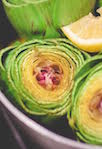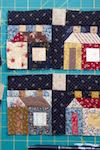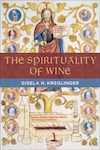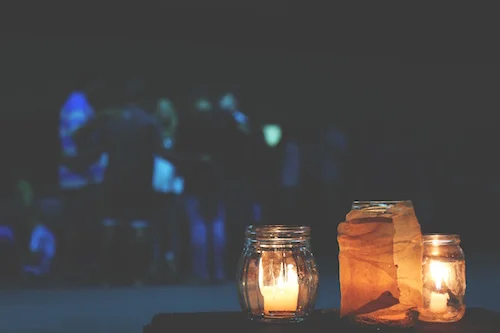I cannot make my neighbors less fearful, uncertain, or afraid. I cannot change the world or stop the violence. I can, however, in my little place on the margin of life, faithfully seek to live, think, and speak hopefully. Perhaps it will be a spark that will spread more widely and do some good—after all, hope is life-giving, generative. Perhaps not, but that is not my concern. My concern is to make culture faithfully, culture that will encourage people to flourish in this broken world. And being hopeful is culture making because creativity and art and flourishing is impossible without hope.
On Taking a Band Break, Comedic Short-Story Song Writing, and Grandma Carolee: Brooke Waggoner Interviews Kelsey Kopecky
As a writer in the past I’ve been like, “Okay, how can I say this message and encrypt it in this level of poetry that sounds interesting for the sake of poetry?” But ever since picking up an electric guitar, my music is sounding so much like when I’m on the phone with my best friend Laura telling her things about Minneapolis where I grew up—songs that are trying to say what I want to say but you talk too much type of lyric. I would have never written that before because I would have thought it isn’t poetry.
 From the day we moved to this old farmhouse called Maplehurst, I kept my eye on the open lawn directly across from the front door. I never looked at the grass and weeds there without seeing them superimposed with roses and daisies. But the gap between vision and reality is enormous. There is a wasteland between the two, and while we are in it we struggle to continue seeing the dream that led us there.
From the day we moved to this old farmhouse called Maplehurst, I kept my eye on the open lawn directly across from the front door. I never looked at the grass and weeds there without seeing them superimposed with roses and daisies. But the gap between vision and reality is enormous. There is a wasteland between the two, and while we are in it we struggle to continue seeing the dream that led us there.
 The structure underneath—the bones of the house—are good because someone we trust knows they’re good, sturdy, strong and able to be restored, and they can tell us this and we believe them. And maybe that’s what we’re after all along—someone who comes along to tell us that there is treasure here in our bones, someone who can see the intrinsic value in what others might consider a teardown.
The structure underneath—the bones of the house—are good because someone we trust knows they’re good, sturdy, strong and able to be restored, and they can tell us this and we believe them. And maybe that’s what we’re after all along—someone who comes along to tell us that there is treasure here in our bones, someone who can see the intrinsic value in what others might consider a teardown.
 I don't notice the robin making her nest. Neither do I notice when she lays her eggs. I don't know how long she bides her time there, waiting for their hatching. After two weeks of rain, the kids and I come outside, squint in the sun, and find four tiny beaks stretching up from a nest on our meter box. The mama robin swoops in, drops in her food, and then flies to a nearby branch to keep watch. We are mesmerized.
I don't notice the robin making her nest. Neither do I notice when she lays her eggs. I don't know how long she bides her time there, waiting for their hatching. After two weeks of rain, the kids and I come outside, squint in the sun, and find four tiny beaks stretching up from a nest on our meter box. The mama robin swoops in, drops in her food, and then flies to a nearby branch to keep watch. We are mesmerized.
 No matter where his pastoral vocation called him—country, city, suburb—Dad found a large vacant lot of lawn or weeds to plow under and plant in long straight rows, ordered in relation to the sun (the corn stalks must not overshadow the tomatoes) and surrounded by winter-squash vines prone to wander outside the frame.
No matter where his pastoral vocation called him—country, city, suburb—Dad found a large vacant lot of lawn or weeds to plow under and plant in long straight rows, ordered in relation to the sun (the corn stalks must not overshadow the tomatoes) and surrounded by winter-squash vines prone to wander outside the frame.
It was not Eden, except in his view.
 When I tell people that I am a food writer, they always ask me what I like to cook. I want to ask them if they would ask a film critic to tell them about the movie they are shooting at the moment, but instead I just smile and say, “Scrambled eggs.” That is only part of the truth, but I don’t usually tell them that I started writing about food before I started cooking, creating standards that I could never meet. I do not tell them that fear of failure often means that I eat pre-made guacamole or cheese and crackers for dinner. I worry that this will take away my credibility, even though I know that not everyone who writes about food claims to be good at preparing it.
When I tell people that I am a food writer, they always ask me what I like to cook. I want to ask them if they would ask a film critic to tell them about the movie they are shooting at the moment, but instead I just smile and say, “Scrambled eggs.” That is only part of the truth, but I don’t usually tell them that I started writing about food before I started cooking, creating standards that I could never meet. I do not tell them that fear of failure often means that I eat pre-made guacamole or cheese and crackers for dinner. I worry that this will take away my credibility, even though I know that not everyone who writes about food claims to be good at preparing it.
 When I stitch my little felt ornaments, my fingers sometimes get sore. I take breaks and rub them, looking out the window and listening to the sermon that is streaming. “It is perhaps through the work of kind welcome and laden table and warm bed,” the pastor says, “that the church labors most effectively to bear witness to the reality of the kingdom of God and the welcome that we receive in God in Christ.” He is preaching on the book of Ruth. Ruth! I studied it so many times in college, together with girlfriends all waiting for men, for boyfriends, for husbands, trying to glean some insight from this woman who did strange things indeed to secure her man. That is not the point of the book, the preacher says. I breathe a sigh of relief. Instead, he gleans kindness, hope, hospitality from the passages. The kind of hospitality that hems in, honors, and protects everything about the person being welcomed into our lives.
When I stitch my little felt ornaments, my fingers sometimes get sore. I take breaks and rub them, looking out the window and listening to the sermon that is streaming. “It is perhaps through the work of kind welcome and laden table and warm bed,” the pastor says, “that the church labors most effectively to bear witness to the reality of the kingdom of God and the welcome that we receive in God in Christ.” He is preaching on the book of Ruth. Ruth! I studied it so many times in college, together with girlfriends all waiting for men, for boyfriends, for husbands, trying to glean some insight from this woman who did strange things indeed to secure her man. That is not the point of the book, the preacher says. I breathe a sigh of relief. Instead, he gleans kindness, hope, hospitality from the passages. The kind of hospitality that hems in, honors, and protects everything about the person being welcomed into our lives.
 It is the first morning of vacation in a friend’s condo. I am looking down on the condo’s private beach from my balcony. From way up here, everyone is small, no one too fat, too sexy, too weak, too old, or too young. They are all just specks of human beings swallowed by a vast dance of blurry sandbars beneath an undulating surf. I arrived last night in the dark and went to sleep. This morning, I try to unkink from regular life stresses. I keep telling myself it’s okay if my thoughts walk away from these relentless concerns. The ocean, meanwhile, forgets with ease, content with humming a tune of waves that massage the air like an oscillating fan, a white noise sound machine rising and falling, over and over, an unending breath-like soundtrack.
It is the first morning of vacation in a friend’s condo. I am looking down on the condo’s private beach from my balcony. From way up here, everyone is small, no one too fat, too sexy, too weak, too old, or too young. They are all just specks of human beings swallowed by a vast dance of blurry sandbars beneath an undulating surf. I arrived last night in the dark and went to sleep. This morning, I try to unkink from regular life stresses. I keep telling myself it’s okay if my thoughts walk away from these relentless concerns. The ocean, meanwhile, forgets with ease, content with humming a tune of waves that massage the air like an oscillating fan, a white noise sound machine rising and falling, over and over, an unending breath-like soundtrack.
 A labyrinth is not like a maze, whose purpose is to thwart the walker’s cunning, lose her in a splatter of dead ends, spin him back to the beginning before earning a finish. A labyrinth is a disappointment for a person hoping for such a puzzle. No challenge, no tense thrill. Just one foot in front of the other like any other day. One path takes you to the labyrinth’s center and the same path takes you back out again, exiting exactly where you entered. No matter the paths we walk left to our own devices, for the next six hours there would be no doubt about the way our footsteps were to be set.
A labyrinth is not like a maze, whose purpose is to thwart the walker’s cunning, lose her in a splatter of dead ends, spin him back to the beginning before earning a finish. A labyrinth is a disappointment for a person hoping for such a puzzle. No challenge, no tense thrill. Just one foot in front of the other like any other day. One path takes you to the labyrinth’s center and the same path takes you back out again, exiting exactly where you entered. No matter the paths we walk left to our own devices, for the next six hours there would be no doubt about the way our footsteps were to be set.
Back to the Garden
Perhaps like these women and the little girl, and maybe like others who feed people as part of a parenting vocation or faith community, I see the garden through the lens of my own faith and call to mothering and being mothered, the garden as a connection to nourishment and solace.
And to redemption. A safe haven where I might receive life and pass it on, or get it back from the edge of death.
 Hospitality is serving people and helping people who are in our home. We listen. If they stay in our home, I fix meals and prepare a bed and so forth for them. I read something about—I think it is Benedict's Rule of Hospitality—that there's a difference between serving and being a servant. When I'm serving, I'm in charge. If I'm a servant, you're part of it. If you want to do something to help me, I'll let you do it because that's allowing you in. You're not being in charge. I'm not being in charge.
Hospitality is serving people and helping people who are in our home. We listen. If they stay in our home, I fix meals and prepare a bed and so forth for them. I read something about—I think it is Benedict's Rule of Hospitality—that there's a difference between serving and being a servant. When I'm serving, I'm in charge. If I'm a servant, you're part of it. If you want to do something to help me, I'll let you do it because that's allowing you in. You're not being in charge. I'm not being in charge.
 Someday, I’ll sit under a tent next to my mother’s casket, which will be adorned with yellow roses. Tears and laughter will mingle as I think of that chicken brooding over her, a symbol left behind for her loved ones of her humor and care. I will remember how I was shepherded in childhood, surrounded with death in life and life in death. And I’ll go on.
Someday, I’ll sit under a tent next to my mother’s casket, which will be adorned with yellow roses. Tears and laughter will mingle as I think of that chicken brooding over her, a symbol left behind for her loved ones of her humor and care. I will remember how I was shepherded in childhood, surrounded with death in life and life in death. And I’ll go on.
Objection Sustained
If the need for approval is analogous to the need for a drug, I’m never going to be cured. And I don’t think that’s admitting defeat. It’s giving up the charade that we’re rational animals capable of self-sufficiency, which is neither true of our bodily needs—cities, police, and Wi-Fi are things I want to keep—or of our emotional needs—to be listened to, to be agreed with, and to be congratulated, every so often.
After the state championship, the real world came crashing in and told me that I wasn’t perfect.
 I hadn’t realized that a love of art and beauty could be a liability. I was good at art and beauty.
I hadn’t realized that a love of art and beauty could be a liability. I was good at art and beauty.
Was it that day I skipped in high school when my European History class covered Versailles? Was it my childhood? My culture? Am I just a rebel?
For too long, I have loved myself with shopping beyond my means, and the wake of spending leaves me ripped off. Months later, I will learn the phrase God-shaped hole.
 To be human is to be hungry, to crave milk and honey, to be brought to a banqueting table bannered with love. I’m pulling my chair up to that table, that midnight feast, that last supper, that hospital dumpling delivery, that promise of milk and honey and the ability to enjoy it.
To be human is to be hungry, to crave milk and honey, to be brought to a banqueting table bannered with love. I’m pulling my chair up to that table, that midnight feast, that last supper, that hospital dumpling delivery, that promise of milk and honey and the ability to enjoy it.
 Could it be that God wanted to redeem not only my life but also all the hustle and bustle that life on the winery brings? We work so hard to make a living from growing vines and crafting wine. Could it be that God cared about it and perhaps was even involved in it? This idea is not quite what I had learned in my confirmation classes over the last two years. But was it not true? Had Jesus not made wine as well?
Could it be that God wanted to redeem not only my life but also all the hustle and bustle that life on the winery brings? We work so hard to make a living from growing vines and crafting wine. Could it be that God cared about it and perhaps was even involved in it? This idea is not quite what I had learned in my confirmation classes over the last two years. But was it not true? Had Jesus not made wine as well?
 When I imagine a rich and balanced life, I picture a home much like Sagamore Hill, bustling with active bodies and active minds, where faithful character above all drives the life of the family. One of Roosevelt’s most common phrases for his experiences was great fun. When mind, body, and spirit are working and growing together, life can indeed be great fun, whether on icy river waters or in the comfort of home.
When I imagine a rich and balanced life, I picture a home much like Sagamore Hill, bustling with active bodies and active minds, where faithful character above all drives the life of the family. One of Roosevelt’s most common phrases for his experiences was great fun. When mind, body, and spirit are working and growing together, life can indeed be great fun, whether on icy river waters or in the comfort of home.
 I listen for what I can affirm. I presume that people have treasured enthusiasms that are worthy of affirmation in some small way, and I try to find out what is it about the football game or even the legislation that seems to address a hope or a fear in that person. I start there and see where we can go. I do that in the classroom all the time, when I say something that leads a student to conclude that I’m not on their side. I try to provoke. I think everything I say I really believe, but I do try and direct it in such a way that it invites a sometimes passionate response, or at least that makes the person feel they must respond in order to be true to who they are. And once they do that, that’s not the end of the conversation. That’s the beginning of more questions.
I listen for what I can affirm. I presume that people have treasured enthusiasms that are worthy of affirmation in some small way, and I try to find out what is it about the football game or even the legislation that seems to address a hope or a fear in that person. I start there and see where we can go. I do that in the classroom all the time, when I say something that leads a student to conclude that I’m not on their side. I try to provoke. I think everything I say I really believe, but I do try and direct it in such a way that it invites a sometimes passionate response, or at least that makes the person feel they must respond in order to be true to who they are. And once they do that, that’s not the end of the conversation. That’s the beginning of more questions.
 I pray that when the stakes are higher than a baby swing, she will be surrounded by friends who are eager to help. Friends who will sit with her through the mundane, who will help pull her out of her darkest struggle, and who will chase the beauty in the world and make sure she doesn’t miss it.
I pray that when the stakes are higher than a baby swing, she will be surrounded by friends who are eager to help. Friends who will sit with her through the mundane, who will help pull her out of her darkest struggle, and who will chase the beauty in the world and make sure she doesn’t miss it.


















